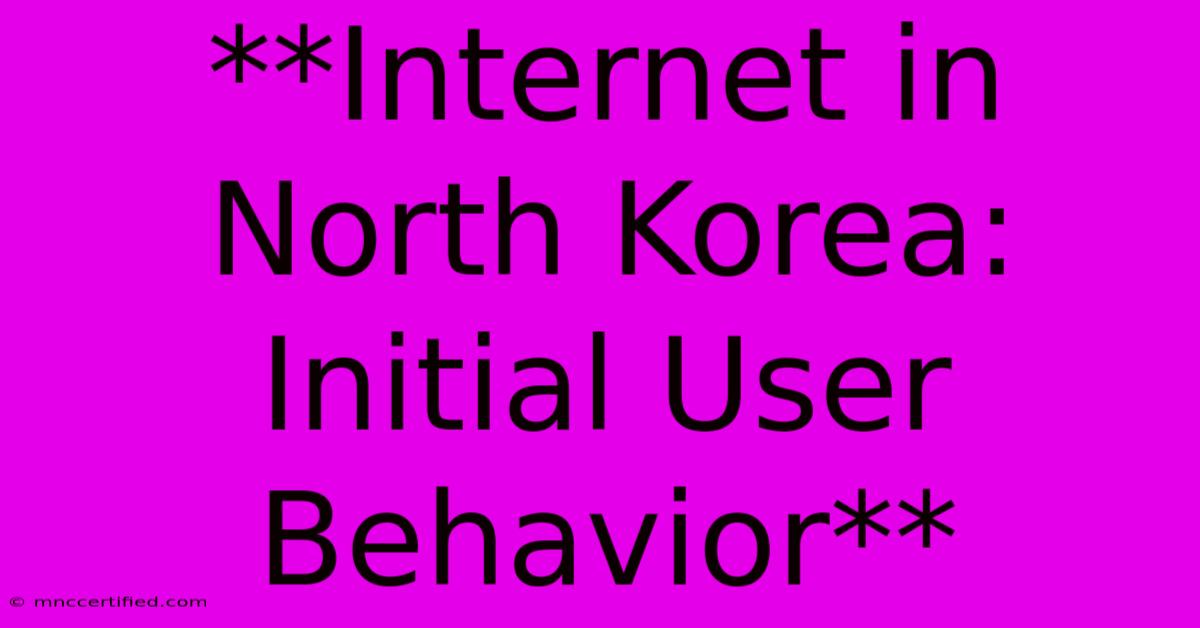**Internet In North Korea: Initial User Behavior**

Table of Contents
Internet in North Korea: Initial User Behavior - A Glimpse into a Closed System
The Democratic People's Republic of Korea (DPRK), more commonly known as North Korea, has long been shrouded in secrecy. Its tightly controlled society, characterized by strict censorship and limited access to information, makes understanding internet usage in the country a fascinating and challenging endeavor. While the internet remains largely inaccessible to the general public, a limited number of individuals have begun to explore the digital world. This article delves into the initial user behavior observed in North Korea's nascent internet landscape.
A Restricted Gateway to the World Wide Web
North Korea's internet infrastructure is heavily restricted, with access limited primarily to a closed intranet known as the "Kwangmyong" network. This network is operated by the government and provides access to a curated selection of websites and information. Access to the global internet is heavily monitored and restricted to a select few, primarily government officials, academics, and elites.
What does this mean for internet users in North Korea?
- Limited content: Users are exposed to a highly controlled environment, with access to only a small portion of the vast resources available on the global internet.
- Heavy censorship: The government strictly monitors online activity, filtering content and restricting access to websites deemed politically sensitive or subversive.
- Propaganda and control: The internet serves as a tool for disseminating government propaganda and reinforcing the ruling ideology.
Early Observations of User Behavior
Despite the limitations, initial observations of internet use in North Korea provide insights into the behavior of its users. Here are some key findings:
- Focus on information: Users tend to prioritize accessing information related to government directives, news, and official publications.
- Cautious engagement: Users are aware of the surveillance and censorship and therefore exercise caution in their online interactions.
- Limited social media use: While social media platforms are present on the Kwangmyong network, their usage appears limited, likely due to restrictions and lack of access to the global social media landscape.
- Technical skills: Users often lack advanced technical skills, and the internet is primarily used for information retrieval and basic communication.
Potential Future Implications
As North Korea cautiously opens its doors to the internet, several potential implications emerge:
- Growing awareness: Increased exposure to the global internet could lead to a growing awareness of alternative perspectives and lifestyles.
- Economic opportunities: Access to the global internet could open up new economic opportunities for the country, particularly in areas like trade and tourism.
- Potential for change: The internet has the potential to foster greater communication and interaction between North Koreans and the outside world, potentially leading to social and political change.
Conclusion
The internet's arrival in North Korea presents a unique opportunity for both the country and its people. While the initial phase is characterized by control and limited access, observing user behavior provides valuable insights into the potential impact of digital connectivity on a closed society. As North Korea navigates this new digital landscape, the evolving internet landscape will be crucial to observe, with its potential to influence the future of the country.

Thank you for visiting our website wich cover about **Internet In North Korea: Initial User Behavior** . We hope the information provided has been useful to you. Feel free to contact us if you have any questions or need further assistance. See you next time and dont miss to bookmark.
Featured Posts
-
New Partnership Fc Barcelona And Codorniu
Nov 08, 2024
-
Ravens Game Tonight Channel And Broadcast
Nov 08, 2024
-
Europa League Man Utd Vs Paok Live Coverage
Nov 08, 2024
-
Property And Casualty Insurance Glossary
Nov 08, 2024
-
Director And Officer Insurance Nonprofit
Nov 08, 2024